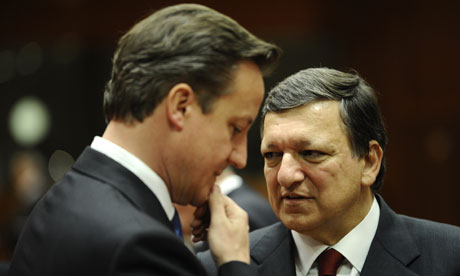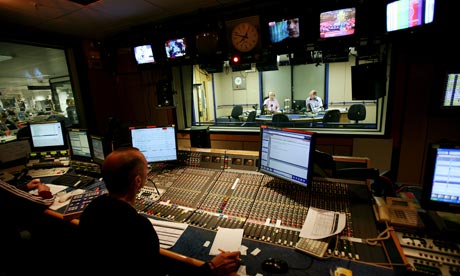It's not just about the current economic environment. History shows that slashing budgets always leads to recession

David Cameron and EC president, José Manuel Barroso, at a meeting of EU leaders in Brussels. Photograph: Lionel Bonaventure/AFP/Getty Images
Last week saw a string of bad economic news reports. The eurozone leaders seem unwilling or unable to change from their austerity policies, even as Greece and Spain fall apart and the core eurozone economies contract. Britain watches on as its economy is heading for the third consecutive quarter of contraction, with an unexpectedly sharp fall in manufacturing. Last week's jobs figures confirmed that the US recovery is stuttering. The largest developing economies that have so far provided some support for world demand levels – especially India and Brazil but even China – are slowing down too. Four years after the financial crisis began, many rich capitalist economies have not recovered their pre-crisis output levels.
Even more serious is the unemployment problem. The International Labour Organisation estimates there are 60 million fewer people employed worldwide than if the pre-crisis trend had continued. In countries like Spain and Greece, overall jobless rates are approaching 25%, with youth unemployment over 50%. Even in countries experiencing "milder" unemployment problems, like the US and the UK, between 8% and 10% are out of work. If we include those who have given up looking for jobs or those who are forced to work part-time for want of fulltime opportunities, "real" unemployment could be easily over 15% even in these countries.
The remedies on offer are well known. Reduce budget deficits by cutting spending – especially "unproductive" social welfare spending that reduces growth by making poor people less willing to work. Cut taxes at the top and deregulate business (euphemistically called "cutting red tape") so that the "wealth creators" have greater incentives to invest and generate growth; and make hiring and firing easier.
It is increasingly accepted that these policies are not working in the current environment. But less widespread is the recognition that there is also plenty of historical evidence showing that they have never worked. The same happened during the 1982 developing world debt crisis, the 1994 Mexican crisis, the 1997 Asian crisis, the Brazilian and the Russian crises in 1998, and the Argentinian crisis of 2002. All the crisis-stricken countries were forced (usually by the IMF) to cut spending and run budget surpluses, only to see their economies sink deeper into recession. Going back a bit further, the Great Depression also showed that cutting budget deficits too far and too quickly in the middle of a recession only makes things worse.
As for the need to cut social spending to revive growth, there is no historical evidence to support it either. From 1945 to 1990, per capita income in Europe grew considerably faster than in the US, despite its countries having welfare states on average a third larger than that of the US. Even after 1990, when European growth slowed down, countries like Sweden and Finland, with much larger welfare spending, grew faster than the US.
As for the belief that making life easier for the rich through tax cuts and deregulation is good for investment and growth, we need to remind ourselves that this was tried in many countries after 1980, with very poor results. Compared to the previous three decades of higher taxes and stronger regulation, investment (as a proportion of GDP) and economic growth fell in those countries. Also, the world economy in the 19th century grew much more slowly than in the high-tax, high-regulation era of 1945-80, despite the fact that taxes were much lower (most countries didn't even have income tax) and regulation thinner on the ground.
The argument on hiring and firing is also not grounded in historical evidence. Unemployment rates in the major capitalist economies were between 0% (some years in Switzerland) and 4% from 1945-80, despite increasing labour market regulation. There were more jobless people during the 19th century, when there was effectively no regulation on hiring and firing.
So, if the whole history of capitalism, and not just the experiences of the last few years, shows that the supposed remedies for today's economic crisis are not going to work, what are our political and economic leaders doing? Perhaps they are insane – if we follow Albert Einstein's definition of insanity as "doing the same thing over and over again and expecting different results". But the more likely explanation is that, by pushing these policies against all evidence, our leaders are really telling us that they want to preserve – or even intensify, in areas like welfare policy – the economic system that has served them so well in the past three decades.
For the rest of us, the time has come to choose whether we go along with that agenda or make these leaders change course.
Do we want a society where 50% of young people are kept out of work in order to bring the deficit down from 9% of GDP to 3% in three years? A society in which the rich have to be made richer to work harder (at their supposed jobs of investing and creating wealth) while the poor have to be made poorer in order to work harder? Where a tiny minority (often called the 1% but more like the 0.1% or even 0.01%) control a disproportionate, and increasing, share of everything – not just income and wealth but also political power and influence (through control of the media, thinktanks, and even academia)?
Maybe we do, but these choices need to be made consciously, rather than by default. The time has come to choose the kind of society we want to live in.






